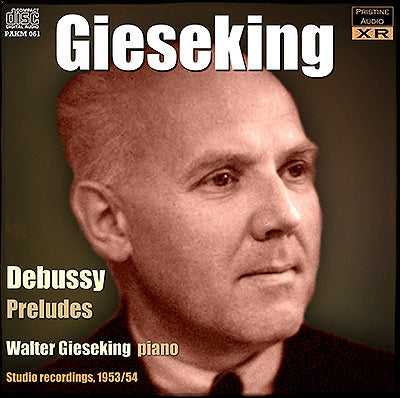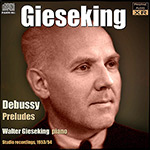
This album is included in the following sets:
This set contains the following albums:
- Producer's Note
- Full Track Listing
- Cover Art
- Historic Reviews
Gieseking's brilliant Debussy Preludes in superlative XR remasters
"Only a supremely optimistic or a very vain pianist will attempt to record these Preludes now that Gieseking has"
For many, Walter Gieseking's Debussy is definitive, and perhaps nowhere more so than here, in the Preludes. These recordings, made for EMI LP issues towards the end of the pianist-composer's life, followed recordings for 78s made in the 1930s and for an American Columbia double-LP in 1951. Previous reissues have struggled to recreate the full tone of Gieseking's piano across the exceptionally wide dynamic range Debussy demands, and remastering these recordings requires constant attention to ensure tape hiss levels don't obscure the quietest passages, whilst preventing any damage from heavy-handed application of digital noise reduction.
At times the EMI microphone has also captured the energetic breaths of the performer - these I have not attempted to excise. The use of Capstan pitch stabilisation software has ensured a particularly solid tone which, coupled with 32-bit XR remastering, has helped to give particularly realistic body and glorious life to the sound of the instrument.
Andrew Rose
-
DEBUSSY Preludes, Book 1
Recorded 12-16 August 1953, Studio 3, Abbey Road, London
Issued as Columbia LP 33CX1098
-
DEBUSSY Preludes, Book 2
Recorded 9-10 December 1954, Studio 3, Abbey Road, London
Issued as Columbia LP 33CX1304
Walter Gieseking piano
REVIEW Preludes Book 1
A definitive version. Tackling them afresh - this is no re-issue - Gieseking brings to the wonderful collection of pieces all the qualities of poetry they require. Debussy, exacting from the piano more and more colour and effect, set his sights high, but every nuance, every shade of balance, and every inflection of tempo are fully realised on this occasion.
The Preludes are for the most part intimate and domestic, and reasonably simple as far as the plain notes are concerned. So Gieseking, very appropriately, plays them in an intimate manner. But now and again there is a flurry, and a surge of activity in the music, and here the domestic pianist is caught out; but not, of course, Gieseking, who uses his abundant technical resources not to exhihit themselves, but to enable his masterly control of the shape of the music to be kept fully operative throughout the occasional whirlwind - in the middle of Voiles, for example, where for a few bars tonality and animation emerge from the shadows of the whole-tone scale; or in La dance de Puck, where the decoration points, without interrupting, the basic rhythm in a masterly way. But in every one of the Preludes there are a dozen lessons for the pianist, and a dozen reasons for the enchantment of the listener, who is also well served by the recording - steady and mellow, it is ideally suited for its purpose. The surfaces of the copy at hand are not "silent"; but that is almost the only direction in which it might be reasonable to seek improvement in this outstanding Issue.
For listeners with an eye to the historical, Cortot's famous playing of this same set of Preludes is available on H.M.V. BLP1006. They were reviewed in their SP form by W.R.A. in February, 1951; but it must be admitted that at the time of their recording Cortot was not at his best, and they are not wholly representative of his playing. A dispassionate listener must certainly choose Gieseking, who gets a better recording, and whose performance is suffused with far greater poetry and backed by a more adequate reserve of technical power than was available on the earlier occasion.
M. M., The Gramophone, January 1954
REVIEW Preludes Book 2
Only a supremely optimistic or a very vain pianist will attempt to record these Preludes now that Gieseking has done so. Neither the playing nor the recording can be faulted; after all, he has for years been the chief exponent of Debussy's piano music outside France, and I very much doubt whether any French pianist could better these performances. Gieseking has both the understanding and the technique for conveying the half-lights and shadowy understatement in these pieces, as also the humour that General Lavine and Samuel Pickwick need. Anyone who already has the first book of Preludes recorded by the same artist in 1954 will automatically buy this set, and I hope many other people will do so too.
R. F., The Gramophone, November 1955
MusicWeb International Review
A transfer like this moves Gieseking’s recordings of the Préludes out of the historical category, and brings them back into real contention as an interpretation of the music which can challenge many modern readings
These performances constituted my first encounter with the Debussy Préludes on record. It is a delight to be able to meet them again in such fine new re-masterings.
In the intervening years we have encountered a great many approaches to
this music, ranging from highly scented romantic impressionism to a
strictly literal interpretation of the notes on the page. This is indeed
music that can admit of a wide range of stylistic pianism. These
Gieseking recordings remain a monument to a great artist whose Debussy
was always highly admired in its day, and commands attention nearly
sixty years later.
Earlier transfers of this material have
however not always been wholly successful in capturing the original
quality of the performances. Even in their day, I suspect these were not
among the highest fidelity recordings, and the mono sound has tended to
underline Gieseking’s sometimes unexpectedly fast traversal of the
scores making some passages sound rather superficial. These carefully
engineered transfers totally change that. The recordings sound fresh and
full of life; they remain mono, but they could have been set down ten
years ago, not sixty. There is a ring to the higher notes which produces
a tangible sense of ecstasy, and the piano sounds realistically placed
in a resonant acoustic - earlier EMI transfers from the original tapes
have had a sense of confinement in a smaller room than one would find
ideal in this music.
A transfer like this moves Gieseking’s recordings of the Préludes
out of the historical category, and brings them back into real
contention as an interpretation of the music which can challenge many
modern readings. Taking them on this level, one must admit that
sometimes his speeds are a bit brisker than we would expect nowadays.
That is of no real consequence; these are performances that are classics
in every sense of the word. The sleeve note quotes from the Gramophone review of 1955: “Only a supremely optimistic or a very vain pianist will attempt to record these Preludes
now that Gieseking has done so.” Well, one is grateful for the many
pianists who have subsequently essayed these works; but Gieseking
remains a benchmark by which his ‘optimistic’ or ‘vain’ successors can
be measured.
The notes on the transfers comment that the
original recordings “captured the energetic breaths of the performer”,
which “I have not attempted to excise.” Well, nobody in their senses
would listen all the way through this CD desperately trying to catch
hints of such extraneous noises; and I have to say that if they were
still present I didn’t notice them. The sleeve states that there are
full programme notes available online, but when I looked these consisted
solely of links to the relevant Wikipedia articles and copies of the
scores from ISMLP.
This is a glorious release.
Paul Corfield Godfrey
MusicWeb International, August 2013

